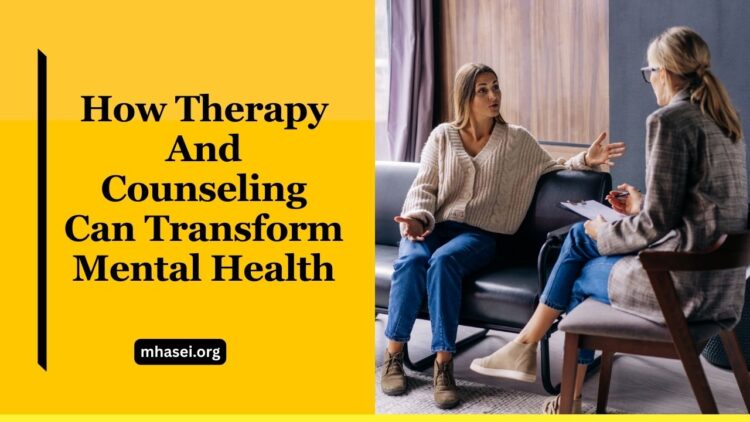In 2025, mental health continues to dominate global conversations, with rising rates of anxiety, depression, and stress-related disorders. According to recent health surveys, nearly 1 in 5 adults experiences a mental health challenge annually, and millions worldwide struggle without adequate support.
The good news? Therapy and counseling are proven to transform lives by offering structured strategies, coping tools, and emotional healing.
Whether it’s cognitive behavioral therapy (CBT), psychodynamic therapy, or group counseling, these interventions provide long-term benefits for both individuals and society.
Why Therapy and Counseling Matter
Therapy and counseling do more than just treat mental illness—they empower people to manage stress, build resilience, and live fulfilling lives. Here’s why they are essential:
- Accessibility of support: Teletherapy platforms and online counseling services have expanded access, especially post-pandemic.
- Personalized care: Therapy adapts to individual needs, whether for trauma, grief, relationship struggles, or severe psychiatric conditions.
- Economic benefits: For every $1 invested in therapy, the global economy saves about $4 in productivity and health costs.
- Breaking stigma: Increased awareness has encouraged more people to seek professional help, reducing long-held taboos.
Types of Therapy That Transform Mental Health
| Therapy Type | Focus Area | Key Benefits |
|---|---|---|
| Cognitive Behavioral Therapy (CBT) | Thoughts and behaviors | Effective for depression, anxiety, and phobias |
| Dialectical Behavior Therapy (DBT) | Emotion regulation | Helps with borderline personality disorder, self-harm |
| Psychodynamic Therapy | Past experiences and unconscious processes | Insight, long-term personality change |
| Group Therapy | Shared experiences in group setting | Peer support, reduces isolation |
| Family/Marriage Counseling | Relationship dynamics | Improves communication, conflict resolution |
| Online/Teletherapy | Remote accessibility | Convenient, cost-effective, and confidential |
How Therapy Improves Mental Health
1. Reduces Symptoms of Anxiety and Depression
CBT has been shown to lower anxiety and depressive symptoms by up to 60% when consistently applied. Therapy provides practical strategies to challenge negative thought patterns and replace them with healthier coping mechanisms.
2. Enhances Emotional Regulation
Therapies like DBT teach skills such as mindfulness, distress tolerance, and emotional regulation—crucial for people managing intense emotions.
3. Improves Relationships and Communication
Counseling helps individuals and families build stronger communication, resolve conflicts, and create healthier support systems. Stronger relationships often result in better mental well-being.
4. Prevents Severe Crises
Early therapy interventions can prevent hospitalizations, suicide attempts, and long-term disability, saving lives and reducing healthcare costs.
5. Empowers Long-Term Resilience
Unlike medication alone, therapy equips people with lifelong skills that protect against future stress and setbacks.
The Global State of Therapy in 2025
- Demand is rising: More than 40% of adults report interest in therapy, showing growing openness to professional help.
- Telehealth boom: Over 30% of therapy sessions are now conducted online, making mental health care more accessible than ever.
- Youth focus: Rates of depression and anxiety in teens have risen, making school-based counseling programs essential.
- Workplace support: Employers increasingly provide employee assistance programs (EAPs) and therapy benefits to reduce burnout and boost productivity.
Why Counseling Is Cost-Effective
Counseling not only benefits individuals but also entire economies:
- Reduced healthcare spending on untreated mental illness
- Increased productivity and reduced absenteeism at workplaces
- Stronger family units and reduced societal costs associated with addiction or crime
The transformative power of therapy and counseling cannot be overstated. In 2025, as mental health challenges rise globally, these interventions offer hope, healing, and resilience.
From reducing symptoms of anxiety and depression to building stronger relationships and preventing crises, therapy changes lives for the better.
Accessible, cost-effective, and adaptable, therapy is not just treatment—it’s a pathway to a healthier and more productive society.
FAQs
How long does it take for therapy to show results?
Many people notice improvements within 6 to 12 sessions, though long-term therapy may be recommended for chronic conditions.
Is therapy effective without medication?
Yes. For mild to moderate mental health issues, therapy alone can be highly effective. For severe conditions, combining therapy with medication is often best.
Can online counseling be as effective as in-person therapy?
Yes. Research shows teletherapy can be just as effective, especially for anxiety, depression, and stress-related disorders.




